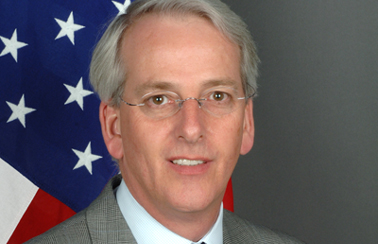
From Thom Shanker and David M. Herszenhorn, the New York Times: The American ambassador to NATO on Friday dismissed recent expressions of outrage from Moscow over proposed missile defenses in Europe, saying that the NATO deployment will proceed “whether Russia likes it or not.”
The ambassador, Ivo Daalder, said the United States was well aware that “there are significant forces within Russia” that believe that the alliance’s system of radars and interceptors could blunt Moscow’s own arsenal of missiles, and thus undermine Russia’s strategic deterrent.
Mr. Daalder said he would meet officials from Moscow at NATO headquarters in Brussels next week to explain — once again — that the alliance shield is designed solely to defend against a potential missile attack from Iran.
But Mr. Daalder also noted that recent complaint, especially from President Dmitri A. Medvedev of Russia, might be motivated by the demands of domestic politics ahead of national elections there. The American commitment to work with NATO allies and deploy the missile shield is founded on a belief that Iran is accelerating its program to field missiles capable of reaching across NATO territory in Europe, Mr. Daalder said. . . .
“Whether Russia likes it or not, we are about defending NATO-European territory against a growing ballistic missile threat,” Mr. Daalder said. “We will adapt the timing and the details to that threat, which is why the focus of our joint effort ought to be about how to figure out how to reduce that threat rather than trying to threaten and retaliate for a deployment that has nothing to do with Russia. . . .”
A spokesman for Russia’s Foreign Ministry told reporters on Thursday that the missile-defense issue would be a focus of a meeting between Russian and the NATO council’s foreign ministers on Thursday.
Separately, senior officials in two former Soviet republics, made statements this week in support of Russia’s position. “We share the defense capability concerns and risks of Russia,” President Aleksandr G. Lukashenko of Belarus told Interfax. “Today we are under the protection of Russia’s nuclear umbrella and if the interests of this umbrella are damaged by any grouping, it means damage and danger for us.”
Meanwhile, the speaker of Parliament in Kyrgyzstan said his government supported Russia’s response and its efforts to negotiate a resolution of the dispute. (photo: U.S. State Department)
Image: state%2010%2019%2010%20ivo%20daalder.jpg
